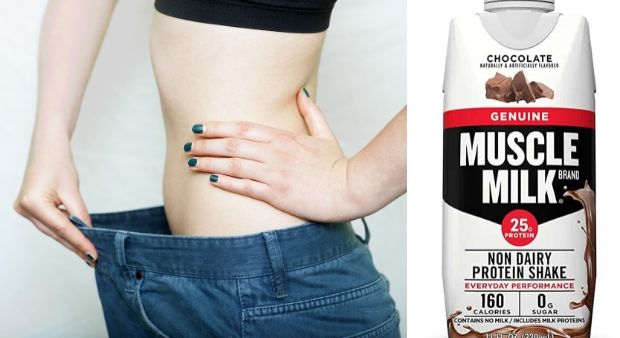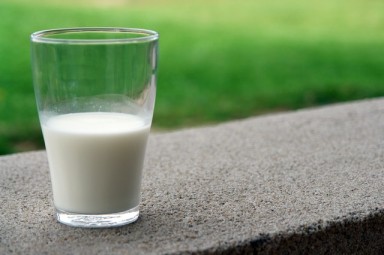Is Muscle Milk Good for Weight Loss?
Is Muscle Milk Good for dieting? How about Muscle Milk for weight loss without muscle loss?
Muscle Milk is an effective product with some misunderstood features.
In this article, we will take a long look at what the latest science says about the benefits of Muscle Milk.
This would be mainly geared towards people who are in a weight loss plans or who work out.
And at the end of the article, we will reveal how some of the most common complaints about Muscle Milk actually reveals a misunderstood benefit.
Muscle Milk is a great source of protein
Let’s take a quick look at the main ingredients in Muscle Milk.
When working out, Muscle Milk can be really great for speeding up your weight loss.
Casein
The major source of protein in milk is casein. It’s particularly abundant in cow’s milk.
Casein is a major component of cheese. Casein isn’t easily to mix in water or milk, and you wouldn’t expect it to be. Nobody adds cheese to a smoothie, after all. But the casein in Muscle Milk is micronized into tiny particles to make it easy to mix.
The insolubility of casein is what makes it so useful as a weight loss aid. Casein forms a gel in your stomach. It doesn’t move down your digestive tract quickly, so your stomach has a chance to break it down more completely.
You can think of casein as a kind of slow-release protein. It keeps releasing amino acids while your muscles are recovering from working them out. Scientific research tells us that this property reduces muscle fatigue.
Your muscles get a steady supply of the amino acids they need to rebuild stronger fibers. This means that you don’t have as many aches and pains that could keep from your next workout.
And because casein releases a building block of brain chemicals called tryptophan, it’s easier to keep up your mental attitude of winning weight loss and your discipline for sticking to your diet.
Whey
Muscle Milk includes both whey protein concentrate and whey protein hydrosylate. The latter is considered the purest form of whey.
There have been at least 163 scientific studies of the uses of whey in promoting weight loss. Many of these studies focused on using whey to help dieters who exercise lose fat and retain muscle. Here are some of the highlights of the research:
Whey promotes muscle preservation when it is consumed as part of a “mixed macronutrient” meal. You don’t just want protein. You also want carbohydrates and fat to help your muscles absorb the protein they need for rebuilding. (Don’t forget to stay hydrated. Water is also part of the muscle building process.)
A clinical trial found that dieters get the greatest benefit from muscle-building supplements containing whey when they consume them either immediately after a workout or just before they go to bed.
Not able to work out as vigorously as you used to? There has also been a clinical trial in the Netherlands that found that the combination of whey, leucine (an amino acid that is abundant in dairy products), and vitamin D enhances weight loss efforts in older people who have become obese and can’t work out vigorously.
It’s still necessary to restrict calories and to get moving, but whey supplementation helps out of shape people who diet and exercise
A review of scientific research tells us that whey stimulates greater gains in muscle mass than other sources of protein, such as soy. Whey in your protein supplement helps you lose fat, not muscle, when you reduce calories. And whey helps people avoid the natural loss of muscle mass that occurs during aging. But Muscle Milk doesn’t stop there.
Lactoferrin and lactalbumin
These two components of Muscle Milk are better known for their beneficial effects on the immune system. In mother’s milk, lactoferrin helps the baby fight off bacterial infections.
It is also antiviral.
Scientists have studied lactoferrin in supporting cancer therapy. Lactalbumin is a great source of the amino acid glutamine, which helps the body maintain acid-base balance, and also has immune-enhancing benefits.
But the underreported benefit of lactoferrin and lactalbumin is that they also help the body stay in energy balance. They help your metabolism use the calories you consume.
Research into the metabolic benefits of whey has found that lactoferrin and lactalbumin have two complementary benefits for weight loss:
- Lactoferrin supports weight loss, and
- Lactalbumin prevents fat gain.
How does that work?
The honest truth is that scientists don’t know for sure. There haven’t been enough clinical trials involving people. But a series of laboratory experiments (reported in the study linked above) have revealed that lactoferrin causes weight loss in animals independently of how many fewer calories they consume.
And lactalbumin, in laboratory experiments with animals, causes the majority of weight loss to be due to loss of body fat.
More importantly, lactoferrin and lactalbumin help restore control over appetite. As we’ll explore in more detail at the end of this article, it’s important that your weight loss product taste good, but it shouldn’t taste so good you can’t stop eating or drinking it. You need a product that retains all the benefits of healthy appetite control.
Medium-chain triglycerides, also known as MCT
Muscle milk contains MCT.
Medium-chain triglycerides are healthy fats. There have been at least 13 clinical studies involving at least 749 volunteers that have explored the benefits of MCT for weight loss.
Clinical trials confirm that taking MCTs decreases body weight, decreases weight circumference, decreases hip circumference, reduces total body fat, reduces subcutaneous fat (the fat you can see, just under the skin), and reduces visceral fat (the more dangerous fat between internal organs).
The effects of taking MCTs aren’t huge.
They may help you lose about one pound more than you would otherwise lose on your diet. They may help you lose about 1 cm (a little less than half an inch) more off your waist or hips.
But the benefits of MCTs with other components in your diet and your exercise routine can be substantial.
There are some ingredients in smaller amounts in Muscle Milk that also help you lose fat and keep muscle that get an unfair bad rap.
A small amount of fructose, for instance, actually assists weight loss. As long as you don’t consume more than 25 grams (about 100 calories) of fructose in any one day (that’s about the equivalent of a cup of juice or two pieces of fruit), your liver is stimulated to handle glucose more efficiently. Fructose is natural and non-toxic.
The problem is consuming too much fructose added to baked goods and candies to keep them fresher on the shelf.
Muscle Milk also contains small amounts of sunflower oil and canola oil. These plant oils are good sources of a healthy fatty acid known as alpha-linolenic acid or ALA. The body transforms ALA into eicosapentaenoic acid (EPA), which reduces inflammation.
There’s just enough ALA in muscle milk to have a mild anti-inflammatory effect when you work out.
And if you have diabetes or prediabetes, there is some scientific evidence that it can help you lose fat while you preserve muscle.
However…there are some criticisms of canola oil
Canola oil has received some criticism for the high likelihood it is sourced from genetically modified crops. Not all people like to consume GMO foods. Little research has been done on their health impact.
Likewise, other research points to health risks like increased inflammation.
The fact canola oil can be highly refined, also takes away some of the nutritional benefits.
The ingredients in Muscle Milk won’t magically make the pounds fall off. But they are precisely formulated to support weight loss with muscle preservation in people who restrict calories and exercise. Even people who aren’t in great shape.
How Come Muscle Milk says “Non-Dairy”?
Some people want to lose weight and do so without consuming dairy products.
The fact Muscle Milk contains “milk”, you would think this product contains dairy.
Likewise, whey protein/casein are derived from milk which is a dairy product.
However, muscle milk is considered nondairy. This is because the lactose and fat have been specifically extracted from these milk-based proteins.
Things to Look Out For
Muscle milk does contain the following ingredients in their mixture:
- Sucralose
- Artificial Flavours
Although FDA approved, sucralose is an artificial sweetener. Some say it can negatively impact gut health.
Artificial flavors on the other hand, provide no nutritional value either…
Muscle Milk isn’t just a protein supplement.
Everybody knows that protein is great for weight loss.
Eating high-protein foods leaves you feeling satisfied. Your body can even make almost all the glucose it needs from the amino acids digested from protein after it rebuilds muscles and maintains your internal organs.
Protein has about the same number of calories as carbohydrate and less than half the calories of fat.
So why wouldn’t you want just to eat protein to lose weight?
There are several good reasons humans can’t live on protein alone.
Healthy kidneys can handle high-protein diets, but if you have even a hint of kidney problems, high-protein is not your optimal choice for a diet.
The body turns carbohydrates into glucose that fuels cells all over the body. There’s a limit to how much glucose your liver and kidneys can process from amino acids in protein. The bottom line is that every adult needs about 40 grams (160 calories) from carbohydrate sources every day.
We need “good fats” (omega-3’s) to make the hormones that regulate inflammation.
We need “bad fats” (omega-6s) to make the hormones that power our immune systems. People tend not to get enough of the “good fats” and to get too much of the “bad fats,” but we need both kinds of essential fatty acids because they are, well, essential.
And our bodies can use other kinds of fat as a long-term, slow-burning energy source.
But why is it important to have fats and carbohydrates for supporting weight loss?
The answer turns out to be muscle.
Every muscle cell is powered by fibers that are made of protein. But every muscle cell is bulked out by a substance called glycogen that it makes from glucose and water.
Each muscle cell makes its own glycogen. But when masses of muscle cells are deprived of glucose, or the whole body is dehydrated, they become scrawny instead of pumped. Your muscles cry out for glucose and water at the end of every workout to replenish their supply of glycogen.
OK, now we know muscles need carbohydrate. What about fat?
Muscle Milk provides Fatty Acids
Muscle Milk provides both “good” and “bad” fatty acids, but the truth is, there are no bad fatty acids. It’s only the proportions that can be wrong.
Muscle Milk provides ALA your body can use to keep inflammation from becoming excessive. But it also provides the omega-6 fatty acids your body needs to make the hormones that break down muscle fibers after you work out so your muscles can replace them with new, stronger fibers.
That’s the reason Muscle Milk helps you preserve muscle while you work off the fat.
But what about the taste?
One of the most common complaints about Muscle Milk is that the flavor is a little off. Some people blame what they think is wrong about the taste on the combination of sweeteners in the Muscle Milk formula.
It’s true that Muscle Milk uses two sweeteners that activate receptors on the tongue a few milliseconds apart so Muscle Milk has a sweet taste all the way going down with just a hint of bitterness. But the overall flavor isn’t a design flaw. It’s to help you gain muscle.
Any muscle building supplement — any food, for that matter — does more for your body if it is more completely digested. Your stomach releases the amino acids in protein with gastric acids.
Why bitter taste may be good?
It turns out bitter tastes stimulate the release of stomach acids that break down protein into the amino acids your muscles will use to build more of the fibers that power them. If you wanted to look up the science, you could do a search on bitter signaling in gastric parietal cells.
The combination of flavors in Muscle Milk activates not just taste receptors for sweetness but also taste receptors for bitterness on your tongue. That starts the secretion of stomach acids. Arginine and iso-leucine, both of which are abundant in whey, have their own bitter taste. They activate taste receptors in the rest of your digestive tract (that you probably didn’t know that you have).
You really don’t want a sweet, unctuous muscle building supplement. You want flavor to work for you to build more muscle, and that’s what you get in Muscle Milk.
Verdict…
So, is Muscle Milk good for dieting? That answer is “Yes!”
but it depends…
Don’t drink it all the time! Once every time you workout should not harm you.
However, if your drinking it every day I just wouldn’t feel comfortable with that.
The fact is, muscle milk does contain artificial sweetner (sucralose) and artificial flavors. So just be wary that you are consuming something that obviously is not natural.
Just remember that it’s you losing weight and preserving muscle, not Muscle Milk.
Muscle Milk helps you make the most of all your hard work at losing weight.
Interested in other articles?
Muscle Milk vs Premier protein
Muscle Milk vs Core Power



